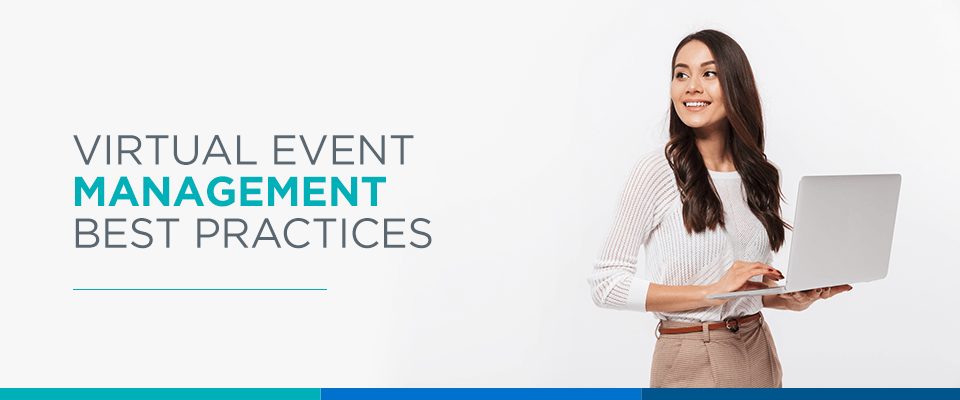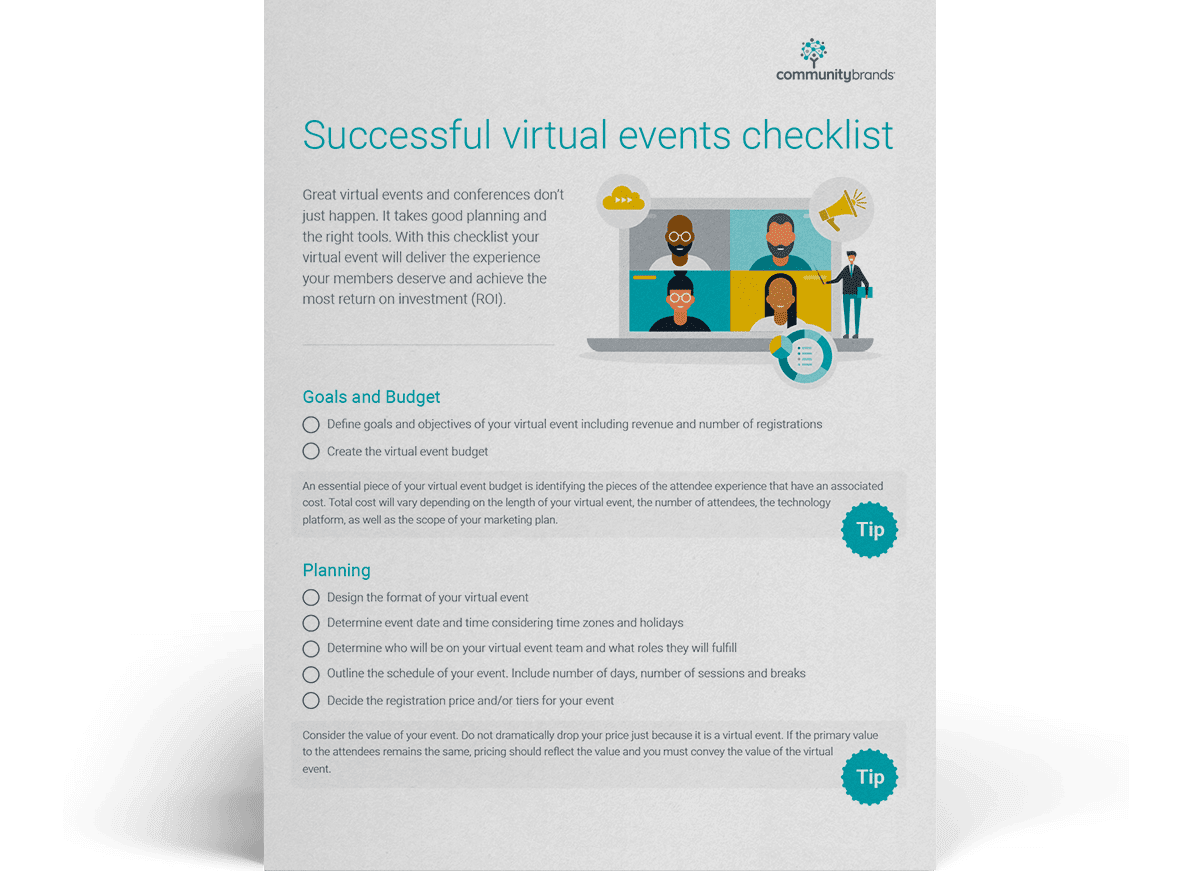
Virtual events have risen in popularity across almost every industry. If you have never hosted a virtual event, you may not know where to begin. Fortunately, learning how to run a virtual event is relatively simple — and even more important, it will help set your association apart.
Review the following best practices to ensure your virtual events are practical and successful.
What is a virtual event?
A virtual event is an event that happens fully online. These events can be conferences, webinars, summits and more. For example, envision a Q&A session you might host with a reputable expert in your field. Rather than have guests attend the experience in-person at an event space, you would hold it via a virtual conference platform like Zoom.
Through technology, you can connect with people worldwide to host an online event that benefits you and your members. Without barriers like location or rental space costs, you can invite hundreds or thousands of people to attend any virtual event you decide to host. There is no need to travel, worry about scaling up or down, or search for the right connections during an event.
If your organization is stepping into the virtual event space for the first time, you may want to start small to test the waters. This way, you will understand which types of online events work will be most successful for you and your members.
Virtual event best practices
1. Choose the right technology and technology partner
Create a realistic timeline to select the right technology platform and prepare for the costs of a tech investment. Do your best to find the technology that supports your vision. Keep in mind what will be most comfortable for your audience and most beneficial to your content. Do you require single sign-on (SSO), mobile optimization for on-the-go attendees, archiving of content, or distribution of continuing education unit (CEU) credits? As you prepare, the more questions you ask, the clearer your needs will become.
Be sure not to manage too many technologies at once. You want to give your attendees a simple process with clear insight into how it will work. When you try to incorporate your mobile app with a virtual conference solution while holding sessions in Zoom, it becomes work for your attendees to keep track of where they need to go and what tool to use. These technologies are still valuable, but look for ways to utilize them in the simplest ways possible which are often before or after the live show hours.
Lastly, test your technology leading up to the day or days of your event. While hiccups are still possible, you can avoid certain technical errors with several practice runs. For example, check that everyone can connect to your virtual conference platform successfully and audio, video and other presentation elements work.
2. Prepare for sessions correctly
Prepare speakers, panelists, staff and other attendee-facing participants. The saying, “Practice makes perfect” is especially true for virtual events. Provide a training for your virtual speakers, over-communicate schedules, set guidelines and expectations for live content, and ensure participants have documentation to keep handy for reference. Consider having speakers attend a training prior to their session and have at least two speakers each session with access to the slide deck in case of technical difficulties.
Equally important is to avoid overcrowding your schedule. Sitting for sessions in person is a much different experience than sitting at your computer. Allot times for breaks and time for attendees to visit other parts of the show. Offer live and pre-recorded sessions at your event for attendees in different time zones. Down time can be supplemented with on-demand content in-between live sessions. You may even consider a virtual happy hour for a fun engagement session.
Many associations may need to offer content for CEU credits — educational content is the reason most people join a virtual event. If you have lots of sessions, consider making some on-demand or spreading your conference out over more days. Consecutive short days are better received than condensed long days. And, share event calendars so attendees can schedule their days effectively.

3. Encourage attendees to participate
Aim to engage your audience with interactive content. Passive content does not work well in a virtual environment. There are too many distractions and too little accountability. Viewers are much more likely to engage with a brand when it is a two-way street. Keep sessions between 20-45 minutes. Include sessions with socialization and networking opportunities to encourage attendee engagement.
Polling, live Q&As, panel discussions and quizzes all work well for session content. Break up heavy content sessions with movement and game breaks to lighten the day. Gamification is a favorite attendee engagement option. For networking and exhibits, chat, audio, and video capabilities are a must. This brings those virtual elements to life and makes them feel less like a website experience, where viewers are simply browsing content.
In the same way, you should encourage audience feedback or collaboration. Give your attendees the ability to leave an impression on the event. Tying in live social media streams, open discussion forums, gamification, and challenges all give your attendees a chance to step into the spotlight and be recognized and remembered at your event. Don’t just host content for them — show them their presence is valued. Schedule diverse speakers to promote inclusivity and representation of your members.
4. Put thought into exhibits and sponsors
Offer a variety of packages and price points. This will allow you to reach a larger audience of potential exhibitors or sponsors. In the virtual world, you have plenty of deliverables to choose from to enhance options for your larger sponsors.
More branding and exposure, more resources such as staff, multiple virtual locations and digital analytics are all key selling points and benefits for your valued exhibitors and sponsors.
When it comes to price, you should not sacrifice anything which could contribute to a less than stellar attendee experience. While your higher-level sponsors and exhibitors pay for more than your standard level, do not skip out on the essentials. Offering a standard package without chat capability or other limitations only serves as a poor attendee experience and will hurt the event overall.
Keep basics the same and find other ways to go above and beyond for your top-level sponsors, such as exclusive emails, giveaways, branding and multiple booths.
5. Incorporate a human element
In some ways, hosting a virtual event can be a bit of a disconnected experience. If you prefer to host a virtual event for any reason, you must ensure it still feels as close to an in-person event as possible. Otherwise, you might receive feedback from attendees that the virtual event feels like they are scrolling through a slideshow rather than receiving valuable information from the exhibits and sponsors you worked hard to put together.
Always work to make digital experiences as personable as you can. Personalize event messaging. Segmented lists allow for targeted messaging about event content and speakers. You can send course information to student members, for example, and session materials to registered attendees. Encourage attendees to interact with each other in chats and breakout rooms. If you have teams joining from the same place, ask them to participate together rather than joining the digital event from their individual offices.
Use virtual events to grow members’ careers.
What is a virtual career fair?
Community Brands research shows that job opportunities are among the most important benefits to members of an association. And while your online career center can be a great way to connect your members with job opportunities and career development tools, you can do even more for your members by hosting virtual career fairs.
Virtual career fairs offer your members a convenient, dynamic, low-cost way to network and engage with employers. But these virtual career events also offer value to your association and employers in your industry.
With virtual career fairs, employers purchase branded online booths where they spotlight open jobs, company information, videos, and other related materials. Job candidates visit these booths during the virtual career event to chat with prospective employers. All interactions can be recorded, rated, and stored for detailed post-event reporting. Employers develop their pipeline of talent, and professionals grow their networks – with your association’s brand as the facilitator.
10 ideas for growing your career center through your virtual events
- Include an ad or page highlighting the career center and its benefits on the microsites for your virtual events.
- Display banner ads during your virtual events that promote your career center.
- Include a virtual booth in your events’ virtual exhibit halls to promote your career center.
- Host career skills sessions at your virtual events. Brand them as “sponsored” by your career center.
- Host online networking or résumé review events and invite industry experts and career coaches to provide insights to your members.
- Host virtual career fairs at your virtual events that are “sponsored” by your career center.
- Offer a virtual career fair booth as a benefit or paid add-on opportunity for your virtual event sponsors.
- Package job posting credits with your virtual event sponsorships in which job posting credits increase with higher levels of sponsorship. For example: Silver Sponsors could receive five job posting credits, Gold Sponsors receive ten, etc.
- Give sponsors and exhibitors of your virtual events a coupon code for a career center discount (for sponsorships, job postings, or other fee-based items).
- Offer employer branding opportunities – such as banner advertisement and “featured employer” status in your career center’s job alert emails – as a benefit or paid add-on opportunity for your virtual event sponsorship packages.
Plan Your Next Virtual Event
Whether you are looking for ways to stay with the times or are interested in offering hybrid events, you can always find ways to improve your event planning strategy. If you haven’t hosted a virtual event yet but are looking forward to hosting one, check out information on our onsite and virtual career events.
YM Careers can help your organization hold hybrid career events that offer membership value, drive revenue and match employers with the right candidates. Whether you want to hold a virtual trade show or plan an online open house, we are here to make your events as beneficial for you and your members as possible.
Speak to an event specialist today to get started with virtual event planning.




